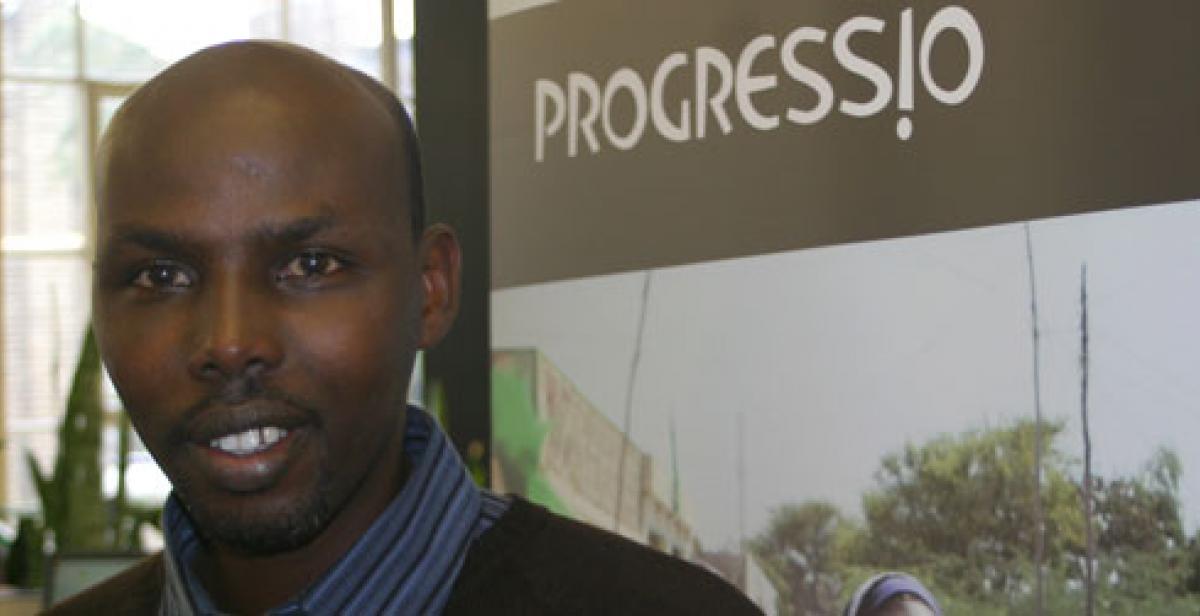Guleid Abdikarim is Director of Talowadag, a Progressio partner organisation in Somaliland that helps people living with HIV to overcome stigma and discrimination. Guleid is in the UK for six months, studying at the Centre for Applied Human Rights at York University. We caught up with Guleid to ask him about his work with Talowadag…
Is there a personal story that sums up your work?
In 2009 a young lady, aged about 25, came to my office. I asked her about her situation. She told me she was HIV-positive and was facing a difficult situation from her community – particularly her friends, neighbours and relatives. She said she had two choices: “To kill myself because I can no longer tolerate these things; or to share my status with some people like Talowadag. Those were my two options and I decided to come to you. What can you do for me?”
I was very sad and disappointed at the stigma and discrimination she faced, but I was happy that she took the best option, which is: “Let me share my status with others, and improve my situation.”
So I said to her: “What we can do, we will give you guidelines and support and then you will be able to help yourself.” This included grants from our income generation project, and training programmes so she would know about HIV.
She learned computer skills and she learned English. She became one of the people I sent to Djibouti and Sudan so she could learn from the experiences of the many other people living with HIV.
I hope one day that she will become the Director of Talowadag – it is my hope that in future someone living with HIV will lead Talowadag.
Her story is an inspiration because previously she was thinking of killing herself – now, with the help of Talowadag, she cares for herself and loves herself a lot. At the end of the training programme with us, she said: “I have realised that I can support myself as well as others living with HIV; I can contribute to Talowadag’s professional activities.”
What type of thing does she do with Talowadag?
In the last two years, the number of young people coming to our office is increasing – so we realised there is a need for prevention work and awareness raising with young people. That’s why we are going into the schools, to share information. And this lady was the one sharing her experiences with the young people in schools.
She would say to them, “Did you ever see a person with HIV?”
They would say, “No.”
She said, “If you do see someone with HIV, what do you think?”
They said, “I will run away, and I will shout some things…”
But when she finished the programme with the kids, they would say: “Oh! Now we will work in this area.”
Tell us more about Talowadag…
Talowadag means “in consultation with one another” and that’s how we work. We are working with 550 people living with HIV – more than 90 of them are women – and with more than 2,000 affected people – their families, mainly children.
These people come to us because they realise there is hope for people with HIV – a space where they can get support. We give them training in positive living – nutrition, treatment, counselling services. These people are the most oppressed in Somaliland. They are poor. So we have an income generation project: they come up with a business idea and we give them grants to get it started. We give then nutrition so they can be healthy and make a success of their business. We make links for them so they can establish their own support groups. We set up support group networks.
Mostly we help people to do something about violations of their rights. If they know their basic rights, there is no need to hide – they can talk openly, and get care and support.
I have learned that if you plan well, and do it well, you can achieve it. My dream was to create an organisation to support people whose rights have been violated – and we did it.



